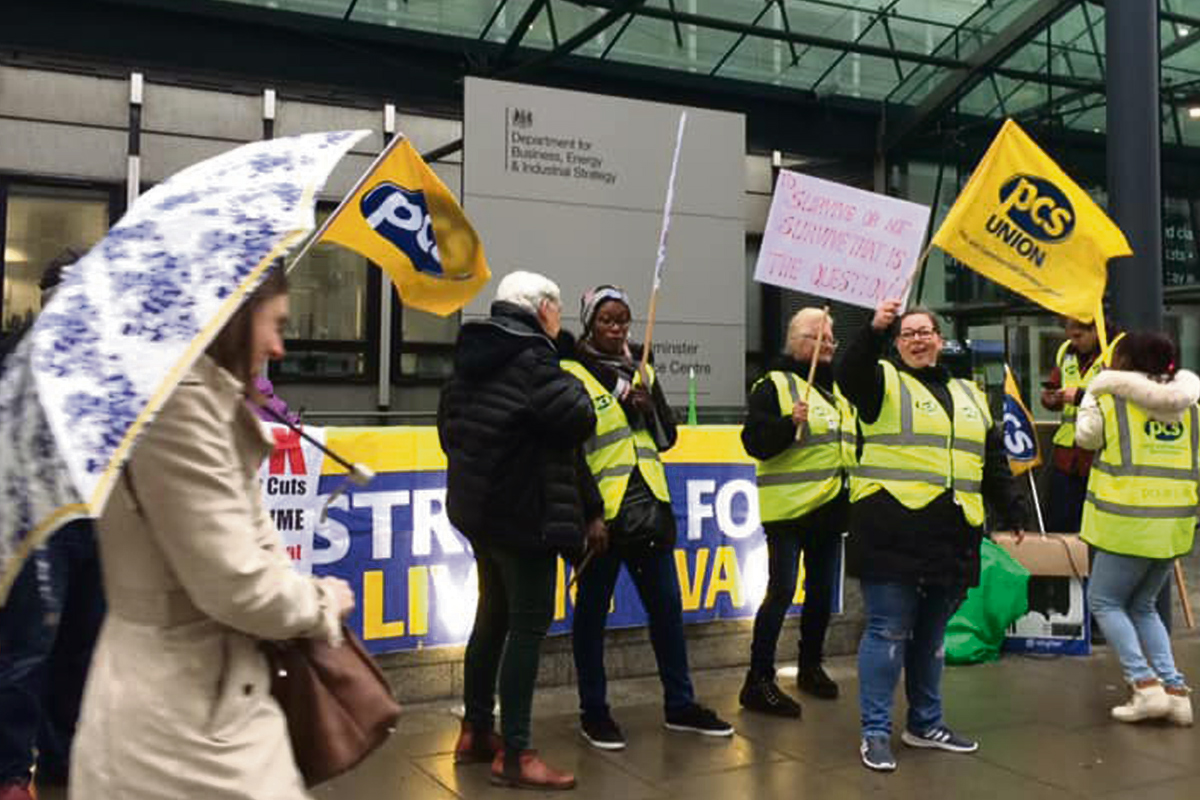Dave Semple, PCS national executive committee member (personal capacity)
On 18 January, reps from across many different sections of the Public and Commercial Services (PCS) union met in Manchester. We discussed the growing crisis of leadership in the union, and formalised the existence of a loose alliance of socialist PCS reps into the Broad Left Network.
Reps at the meeting agreed an outline programme and candidates for the upcoming PCS national elections. This includes agreeing to support existing national executive committee and Socialist Party member Marion Lloyd for PCS national president.
PCS members, made up of civil servants and private sector workers on government contracts, have borne a huge cost due to Tory austerity. Pay has been held back by up to 20% since 2010. More than a hundred thousand jobs have been lost.
Boris Johnson’s re-elected Tory government, despite its pledges to end austerity, has continued efforts to undermine the civil service compensation scheme, which governs the redundancy rights of civil servants.
Our existing union leadership, largely drawn from PCS Left Unity, has proven utterly incapable of leading a national dispute with the government. Two national ballots have failed to reach the 50% participation threshold imposed by the 2016 anti-union laws.
Socialist Party members across all of the unions have fought to organise a united trade union campaign to oppose the undemocratic Tory anti-union laws. The ultimate blame for PCS’ failure to be able to take strike action lies with the government, and its use of the powers of the state to restrict workers’ rights while giving employers ever more rights.
Left Unity deserves plenty of blame as well. They insisted that ballots for industrial action only involve pay and denounced anyone who disagreed as a saboteur intent upon wrecking the union’s national campaign. Yet they have now ditched their previous views and have agreed to include pensions and compensation scheme in the campaign.
All of this has been accompanied by an increasing centralisation of power within the union, led by general secretary Mark Serwotka and unchallenged by national president, Fran Heathcote of Left Unity. Major changes to how the union seeks to organise members have been accompanied by a shift in power from the elected lay reps of the union to the unelected full-time officers.
Key decisions
Broad Left Network supporters meeting in Manchester recounted examples of obstruction on regional and devolved-nation committees, arbitrary decisions taken to reduce support to smaller groups, and a lack of lay-rep involvement in key decisions about where to deploy the union’s resources or oversight of how effective they are. Full time officer-led organising is increasingly discredited.
Union democracy, pay, pensions, office closures, attacks on facility time, defeating redundancies, work in the private sector, social security, mental health at work, transgender rights, women’s representation and many other issues were highlighted by reps as ways in which the existing leadership is failing, and feature as part of the programme on which Broad Left candidates will stand.
The leadership of the union in particular stands condemned for its failure to build the campaign of industrial action that emerged in Walsall, Wolverhampton and Stockport Universal Credit, allowing members to remain isolated.
Moving the draft programme, PCS national executive committee member Alan Dennis, who was an inaugural secretary of PCS Left Unity, decried “the narrow and controlling nature of discussions in Left Unity”, where dissent is dealt with by “bullying or ridicule”.
He welcomed the move to formalise the Broad Left Network as a chance to rebuild an open, democratic, socialist organisation inside PCS that will support serious debate on how we defend the interests of union members. Alan was elected inaugural national secretary of Broad Left Network.
Marion Lloyd, Broad Left Network candidate for National President of PCS, welcomed the meeting in Manchester, which she chaired: “PCS Broad Left Network is not just an electoral organisation, formed for the national elections; its goal will be to raise the confidence and consciousness of our union’s reps, and to make the idea of a ‘member-led union’ more than a tired phrase of the current leadership.”









